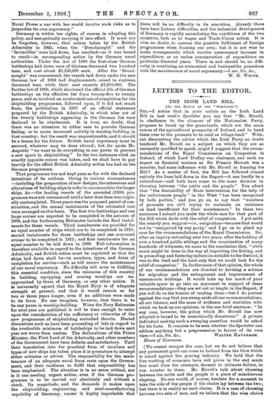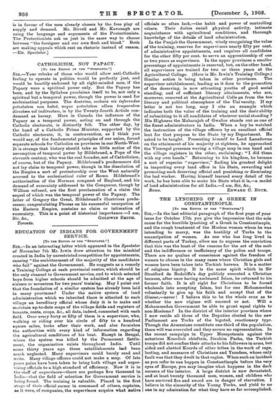LETTERS TO THE EDITOR.
THE IRISH LAND BILL.
ITO THE EDITOR OF THE "SPECTATOR."]
Stn,—I notice that in your article on the Irish Land Bill in last week's Spectator you say that "Mr. Birrell, in obedience to the clamour of the Nationalist Party, proposes to break up the grass-lands, which are the main source of the agricultural prosperity of Ireland, and to hand them over to the peasants to be used as tillage-land." With- out discounting the advice which the Irish Party no doubt tendered Mr. Birrell on a subject on which they are so eminently qualified to speak, might I suggest that the recom- mendations of the Royal Commission on Congestion in Ireland, of which Lord Dudley was chairman, and such an
expert on financial matters as Sir Francis Mowatt was a member, bad some influence with Mr. Birrell in framing his Bill ? As a matter of fact, the Bill has followed almost entirely the lines laid down in the Report—it can hardly be a coincidence—and both have come to the same decision in choosing between "the cattle and the people." You admit that "the desirability of State intervention for the help of the unfortunate people" in the West "has been recognised by both parties," and you go on to say that "numbers of peasants are still trying to maintain an existence on land insufficient for their maintenance." In those two sentences I submit you make the whole case for that part of the Bill which deals with the relief of congestion. I put aside the remedy you suggest—i.e., emigration—because that would not be "recognised by any party," and I go on to plead my case for the recommendations of the Royal Commission. Sir, after an inquiry extending over two years, after the holding of over a hundred public sittings and the examination of many hundreds of witnesses, we came to the conclusion that, " while much might be done in the way of improving the fishing, and in promoting and fostering industries suitable to the district, it was to the land and the land only that we could look for the relief of congestion." In furtherance of that opinion, the whole of our recommendations are directed to devising a scheme for migration and the enlargement and improvement of uneconomic holdings. It would take up too much of your valuable space to go into an argument in support of these recommendations—they are set out at length in the Report, if you will do us the honour of reading them—but I do protest against the way that you sweep aside all our recommendations, all our labours, and the mass of evidence and statistics with which we back up our opinions, in the one brief sentence: "In any case, however, the policy which Mr. Birrell has now adopted is bound to be economically disastrous." A private individual making such a sweeping assertion would be asked for his facts. It remains to be seen whether the Spectator can adduce anything but a prepossession in favour of its own [We cannot reargue the case, but we do not believe that any permanent good can come to Ireland from the blow which is aimed against the grazing industry. We hold that the free working of economic laws will prove in the end much less cruel than the attempts, doomed to ultimate failure, to run counter to them. Mr. Birrell's talk about choosing between the cattle and the people is a piece of mischievous claptrap. No one would, of course, hesitate for a moment to take the side of the people if the choice lay between the two ; but there is in reality no such choice. It is a case of choosing between two sets of men, and we believe that the wise choice
is in favour of the men already chosen by the free play of supply and demand. Mr. Birrell and Mr. Kavanagh are using the language and arguments of the Protectionists. The Protectionists ask us just in the same way to choose between "the foreigner and our own flesh and blood." Both are making appeals which rest on rhetoric instead of reason. —En. Spectator.]







































































 Previous page
Previous page